The start of the new year is an exciting time for marketers to re-evaluate their social media marketing strategies and take advantage of new opportunities as social platforms evolve.
From new features to algorithm updates and disruptive social apps, keeping up with these changes can be challenging, but also allows you to tap into exciting new possibilities to help your company grow better in 2022.
To help you get the most of your social media strategy in the new year, I recently published findings from the HubSpot Blog's Social Media Trends Survey, where I collected data from more than 300 B2B and B2C marketers to answer questions like:
- Which social media platforms are marketers currently leveraging?
- What type of content are marketers posting and which formats do they use most?
- Which platforms, content types, and formats have the best ROI?
- When is the best time and day of the week to post on social media?
- What challenges do social media marketers anticipate in 2022?
- What are marketers' plans and expectations going into 2022?"
I've taken a deep dive through our survey data and made a list of some of the key recommendations social media marketers should consider in 2022. Here are just a few suggestions, based on our data.
8 Data-Backed Social Media Marketing Recommendations for 2022
1. Champion your company values
Content that reflects your brand’s values is the most popular type of content among social
media marketers right now and has the 3rd highest ROI of any content type
This will continue growing in 2022 as 95% of those who leverage this type of content plan on increasing or maintaining their investment, and 21% plan to use it for the first time
This aligns with our previous marketing trends survey, where we found that social responsibility will be a top trend in 2022
Additionally, we found that social media marketers who say their social media strategy has been effective in 2021 are 21% more likely to leverage content that reflects their brand’s values than those who reported an ineffective social media strategy last year
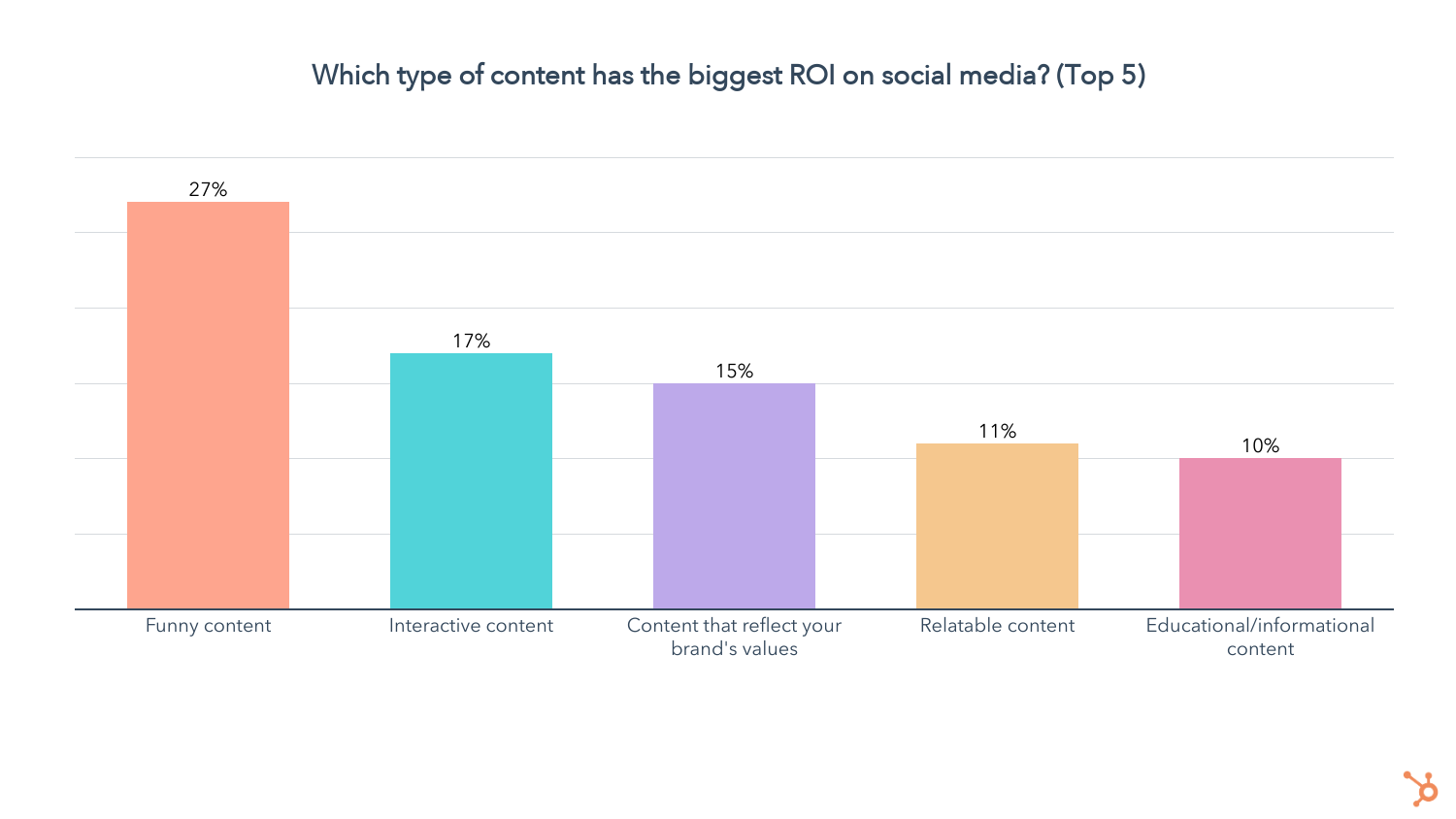
2. Embrace funny, interactive, and relatable content.
Funny content has the highest ROI of any content type and is also rated the most effective by social media marketers
The use of funny content will continue to grow in 2022, with 33% planning to invest more in funny content than any other format.
Additionally, 56% of those who don’t use funny content plan to leverage it for the first time in 2022, while 95% of those who already use it will increase or maintain their investment this year
Interactive content is No. 2 when it comes to usage, ROI, and effectiveness, and will also grow significantly in 2022.
49% of those who don’t leverage interactive content plan to use it for the first time in 2022, while 97% of those who already use it plan to invest more or maintain their investment this year
On top of all that, we found that social media marketers who say their social media strategy has been effective in 2021 are 25% more likely to leverage interactive content than those who reported an ineffective social media strategy last year.
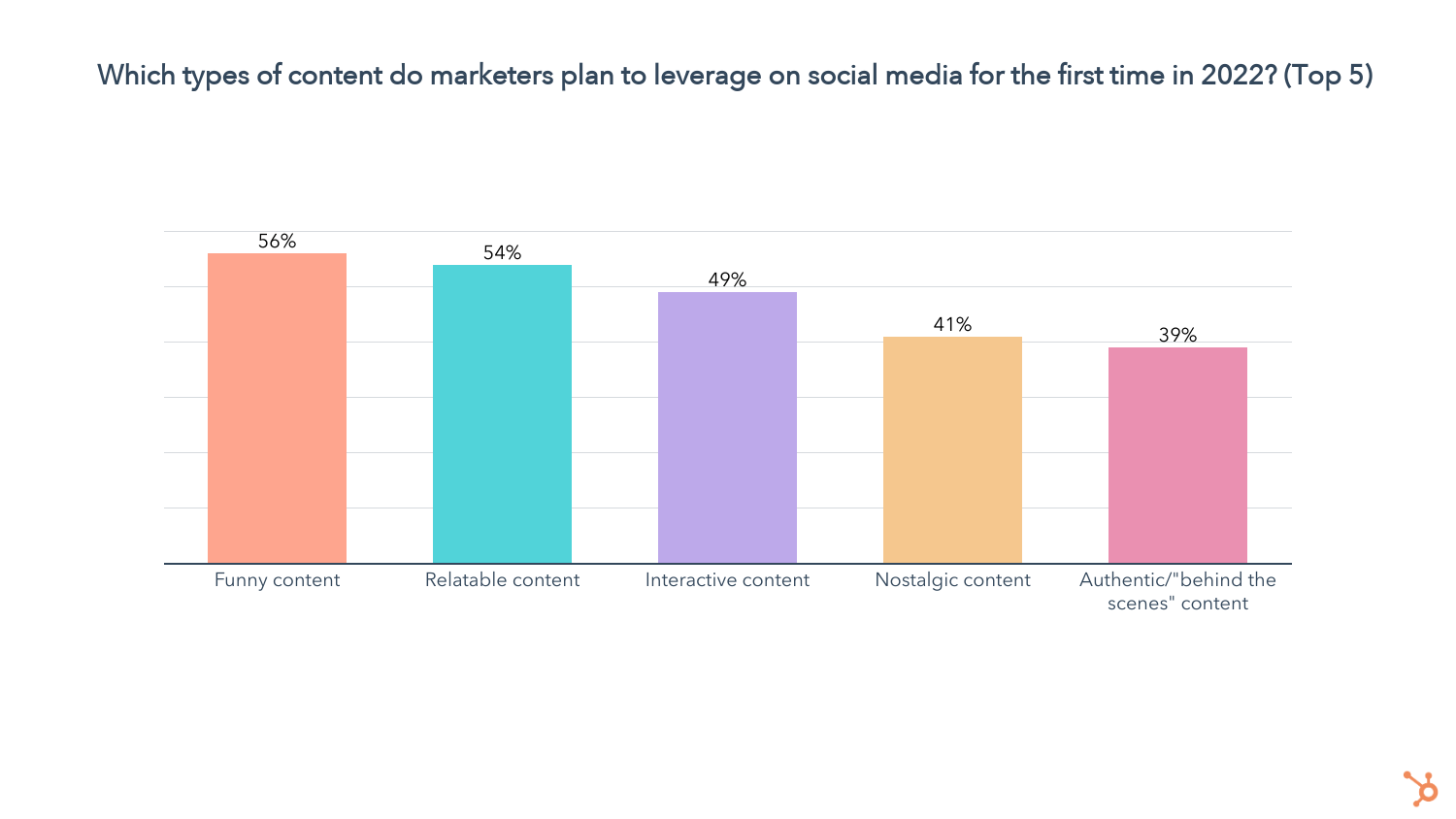
Relatable content will see increased investment among current users as well as first-time users.
54% of social media marketers who don’t leverage relatable content are planning to for the first time this year, while 93% of marketers who already leverage it plan to increase their investment or continue investing the same amount in 2022
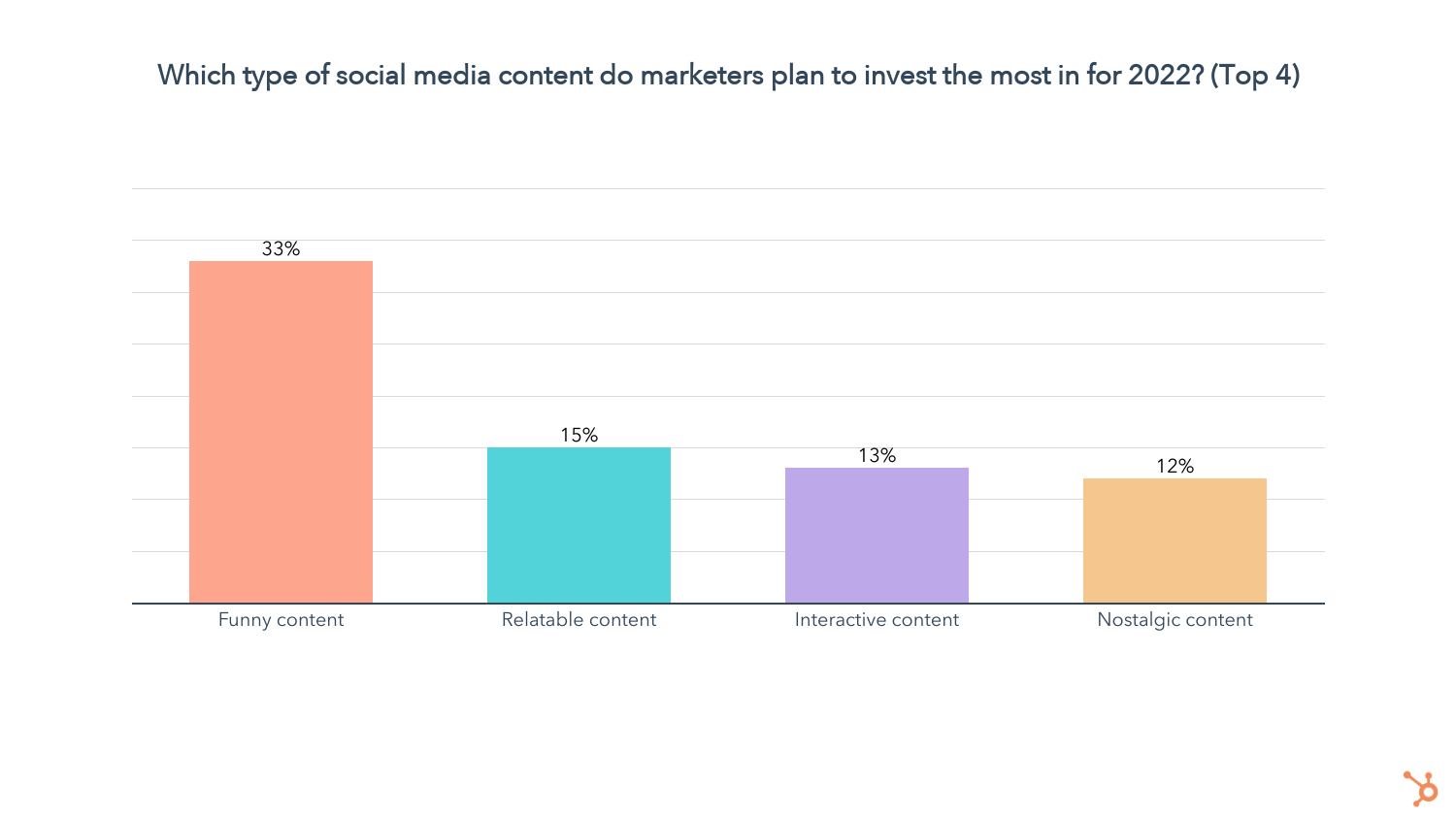
3. Don’t choose influencers based on follower count.
Followers aren’t everything. Influencer marketers are placing an emphasis on quality of content first, then engagement rates, alignment with values, and aesthetic, followed by follower count at #5 on that list.
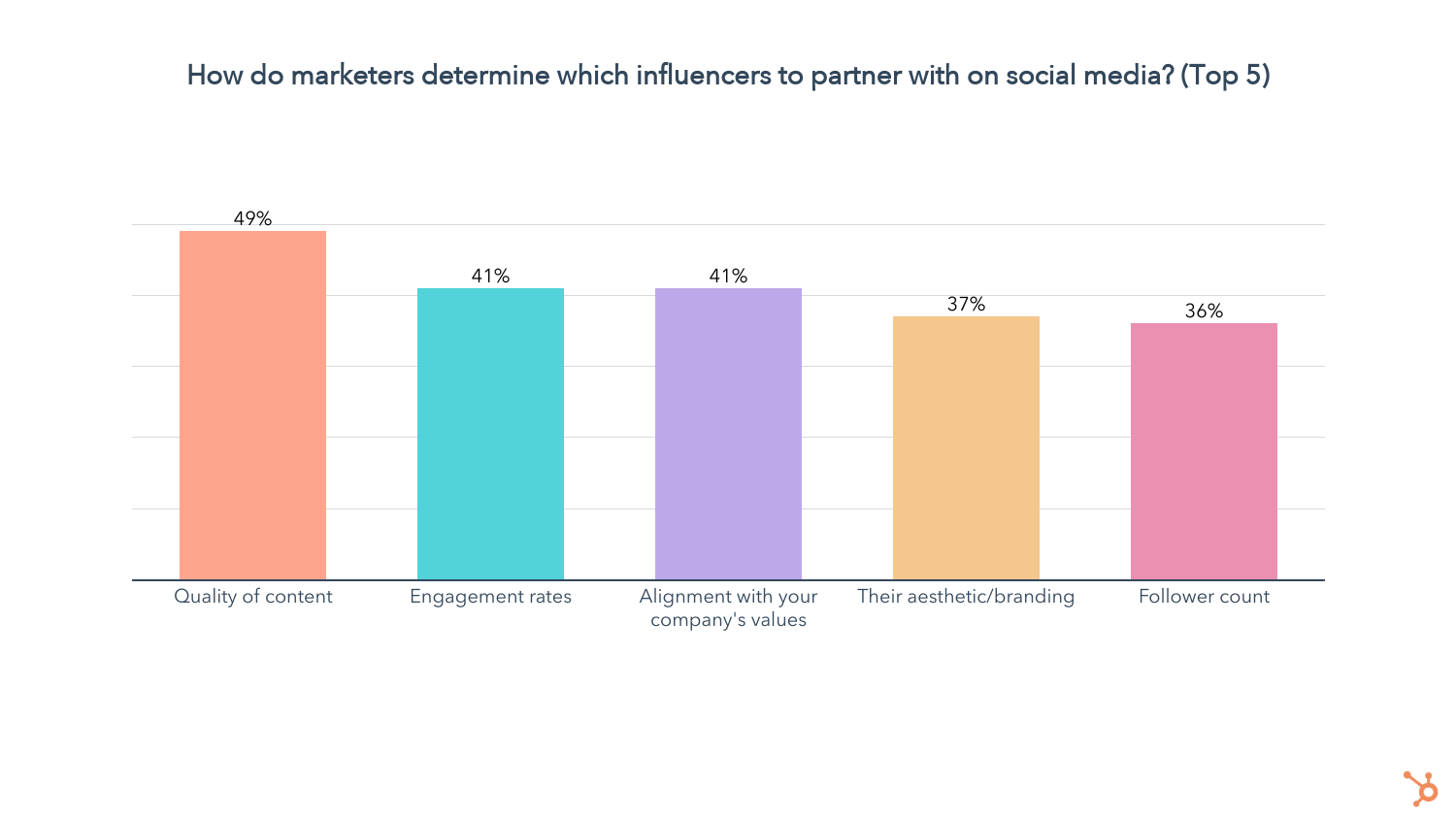
Social media marketers who say their social media strategy has been effective in 2021 are 26% more likely to consider the quality of influencers’ content when determining which influencers to partner with on social media than those who reported an ineffective social media strategy last year
Micro-influencers (10k-100k followers) are the most popular type of influencer marketers work with, but it isn’t necessarily because they are cheaper. The graph below shows that the amount companies pay influencers can vary greatly, even when we account for the size of their following. This supports our finding that follower count is not what marketers are prioritizing when looking to partner with influencers.
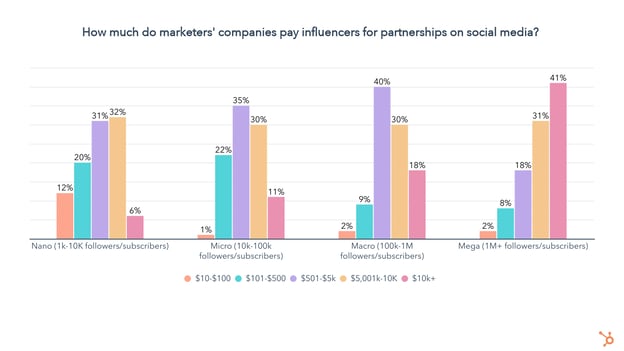
The quality of the influencer’s content, the rate at which their followers engage, and their alignment with your brand can be much more impactful metrics of how much an influencer partnership is worth.
Instagram, Facebook, and Twitter are the most popular platforms marketers leverage when working with influencers.
Facebook has the best ROI for influencer marketing, followed by Instagram, YouTube, Twitter, and TikTok.
4. Explore new or emerging social media platforms and features.
Social media marketers search for new or emerging social platforms to leverage often, with 86% searching at least once a quarter and many searching monthly (29%), weekly (22%) and 20% searching multiple times a week. Just 1% say they never search for new platforms.
The top new or emerging platforms social media marketers are investing in are Twitter Spaces, YouTube Shorts, and Instagram Shops
At the same time, they are pulling their investment in lesser-known live audio platforms (Spoon, Riffr, Discord Stage Channels, Spotify Green Room) as more established ones like Twitter begin to incorporate live audio features.
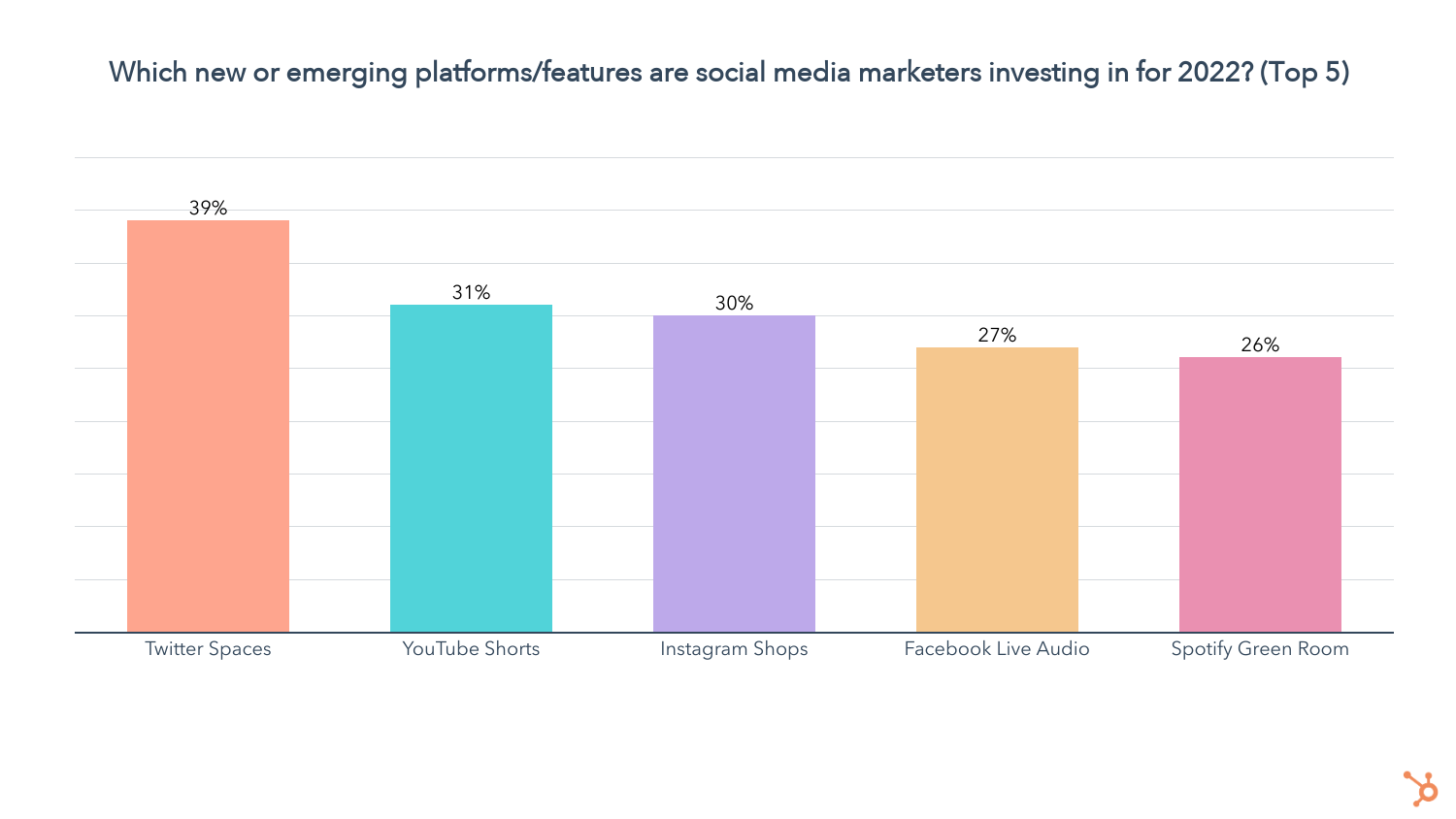
5. Invest in building social media communities.
64% of marketers are leveraging social media communities, and this number will only keep growing, as 30% of those who don’t use social media communities plan to start in 2022.
Additionally, 96% of those who already leverage social media communities plan to invest more or continue investing the same amount this year.
Facebook, TikTok, YouTube, Instagram, and Tumblr are the platforms marketers build communities on most.
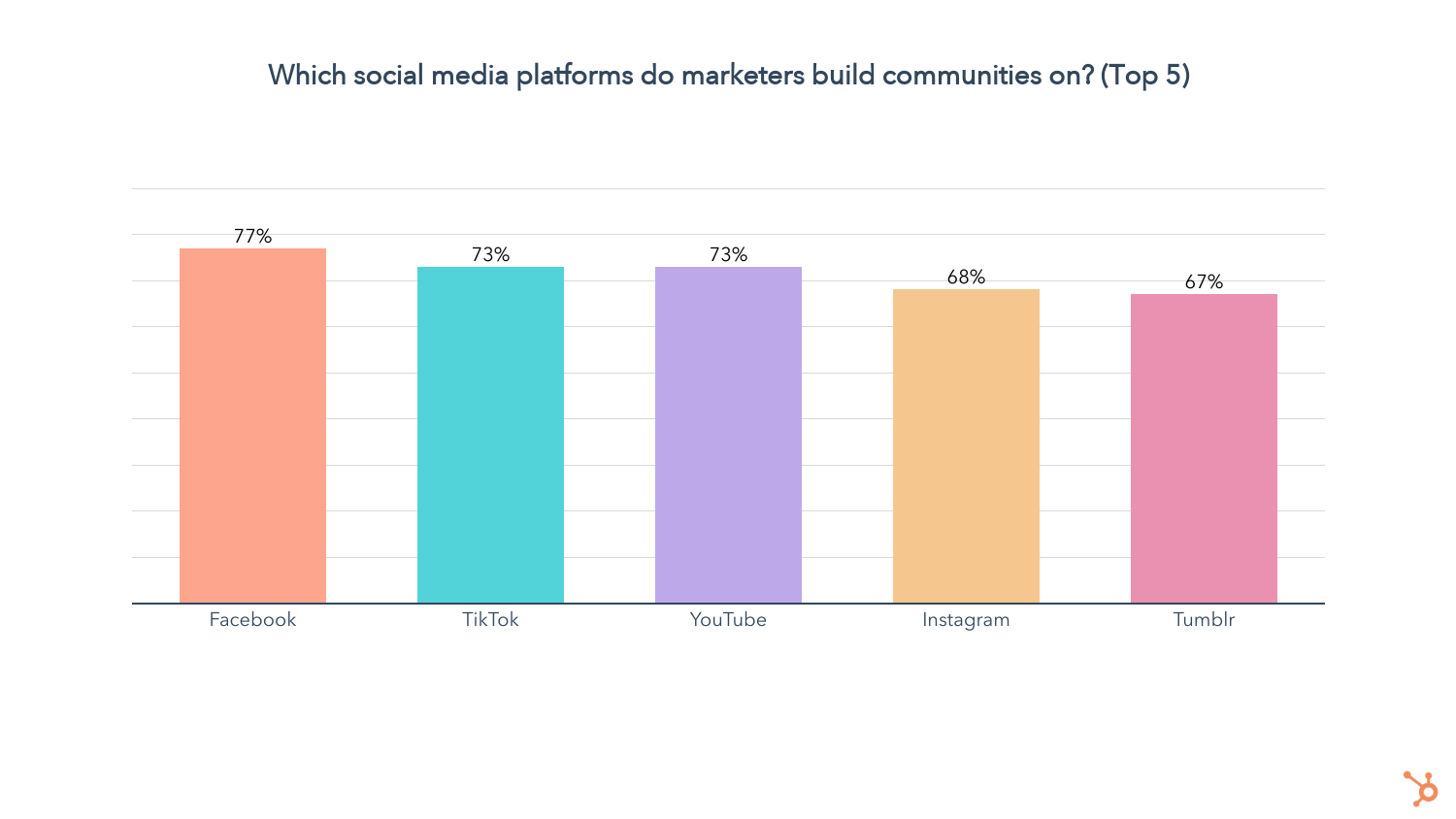
6. Leverage research and data to reach their target audience.
In our survey, we asked marketers how effective or ineffective their social media strategy has been this year. I then examined our data through these two separate groups, the first being those who said their social media strategy was effective, compared to the second which rated their social media strategy as ineffective.
When trying to find their audience on social media, the effective group is:
- 21% more likely to use social listening
- 17% more likely to research the demographics of social media platforms
- 17% more likely to research relevant online communities
- 14% more likely to analyze demographic data their company already has
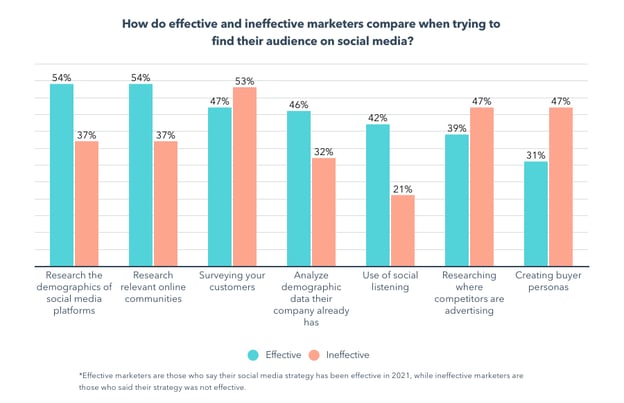
7. To reach younger audiences, create short-form video content that's funny, trendy, and reflects your brand’s values.
Younger audiences like Gen Z (6-24) and Millennials (25-40) prefer shorter video content that is funny, trendy, and reflects a brand’s values, making platforms with short-form video features like TikTok, YouTube, and Instagram ideal for reaching them.
8. To reach older audiences, leverage interactive/educational content on Facebook.
Gen X (41-56) and Baby Boomers (57-75) prefer interactive/educational content, such as interviews/podcasts/expert discussions and live videos, and Facebook is their platform of choice.
More Data-Backed Marketing Insights
Want even more marketing and social media data? Many of the results from the Social Media Trends survey overlapped with the Blog's recent Marketing Trends survey, including the dominance of short-form video, the power of influencer marketing, the opportunity presented in “Live” video and audio chat rooms, and the top social media platforms.
Check out our detailed Social Media Marketing Report here or our Marketing Trends recommendations post here for more recommendations on these topics.
from Marketing https://blog.hubspot.com/marketing/data-backed-social-media-marketing-recommendations
The start of the new year is an exciting time for marketers to re-evaluate their social media marketing strategies and take advantage of new opportunities as social platforms evolve.
From new features to algorithm updates and disruptive social apps, keeping up with these changes can be challenging, but also allows you to tap into exciting new possibilities to help your company grow better in 2022.
To help you get the most of your social media strategy in the new year, I recently published findings from the HubSpot Blog's Social Media Trends Survey, where I collected data from more than 300 B2B and B2C marketers to answer questions like:
- Which social media platforms are marketers currently leveraging?
- What type of content are marketers posting and which formats do they use most?
- Which platforms, content types, and formats have the best ROI?
- When is the best time and day of the week to post on social media?
- What challenges do social media marketers anticipate in 2022?
- What are marketers' plans and expectations going into 2022?"
I've taken a deep dive through our survey data and made a list of some of the key recommendations social media marketers should consider in 2022. Here are just a few suggestions, based on our data.
8 Data-Backed Social Media Marketing Recommendations for 2022
1. Champion your company values
Content that reflects your brand’s values is the most popular type of content among social
media marketers right now and has the 3rd highest ROI of any content type
This will continue growing in 2022 as 95% of those who leverage this type of content plan on increasing or maintaining their investment, and 21% plan to use it for the first time
This aligns with our previous marketing trends survey, where we found that social responsibility will be a top trend in 2022
Additionally, we found that social media marketers who say their social media strategy has been effective in 2021 are 21% more likely to leverage content that reflects their brand’s values than those who reported an ineffective social media strategy last year

2. Embrace funny, interactive, and relatable content.
Funny content has the highest ROI of any content type and is also rated the most effective by social media marketers
The use of funny content will continue to grow in 2022, with 33% planning to invest more in funny content than any other format.
Additionally, 56% of those who don’t use funny content plan to leverage it for the first time in 2022, while 95% of those who already use it will increase or maintain their investment this year
Interactive content is No. 2 when it comes to usage, ROI, and effectiveness, and will also grow significantly in 2022.
49% of those who don’t leverage interactive content plan to use it for the first time in 2022, while 97% of those who already use it plan to invest more or maintain their investment this year
On top of all that, we found that social media marketers who say their social media strategy has been effective in 2021 are 25% more likely to leverage interactive content than those who reported an ineffective social media strategy last year.

Relatable content will see increased investment among current users as well as first-time users.
54% of social media marketers who don’t leverage relatable content are planning to for the first time this year, while 93% of marketers who already leverage it plan to increase their investment or continue investing the same amount in 2022

3. Don’t choose influencers based on follower count.
Followers aren’t everything. Influencer marketers are placing an emphasis on quality of content first, then engagement rates, alignment with values, and aesthetic, followed by follower count at #5 on that list.

Social media marketers who say their social media strategy has been effective in 2021 are 26% more likely to consider the quality of influencers’ content when determining which influencers to partner with on social media than those who reported an ineffective social media strategy last year
Micro-influencers (10k-100k followers) are the most popular type of influencer marketers work with, but it isn’t necessarily because they are cheaper. The graph below shows that the amount companies pay influencers can vary greatly, even when we account for the size of their following. This supports our finding that follower count is not what marketers are prioritizing when looking to partner with influencers.

The quality of the influencer’s content, the rate at which their followers engage, and their alignment with your brand can be much more impactful metrics of how much an influencer partnership is worth.
Instagram, Facebook, and Twitter are the most popular platforms marketers leverage when working with influencers.
Facebook has the best ROI for influencer marketing, followed by Instagram, YouTube, Twitter, and TikTok.
4. Explore new or emerging social media platforms and features.
Social media marketers search for new or emerging social platforms to leverage often, with 86% searching at least once a quarter and many searching monthly (29%), weekly (22%) and 20% searching multiple times a week. Just 1% say they never search for new platforms.
The top new or emerging platforms social media marketers are investing in are Twitter Spaces, YouTube Shorts, and Instagram Shops
At the same time, they are pulling their investment in lesser-known live audio platforms (Spoon, Riffr, Discord Stage Channels, Spotify Green Room) as more established ones like Twitter begin to incorporate live audio features.

5. Invest in building social media communities.
64% of marketers are leveraging social media communities, and this number will only keep growing, as 30% of those who don’t use social media communities plan to start in 2022.
Additionally, 96% of those who already leverage social media communities plan to invest more or continue investing the same amount this year.
Facebook, TikTok, YouTube, Instagram, and Tumblr are the platforms marketers build communities on most.

6. Leverage research and data to reach their target audience.
In our survey, we asked marketers how effective or ineffective their social media strategy has been this year. I then examined our data through these two separate groups, the first being those who said their social media strategy was effective, compared to the second which rated their social media strategy as ineffective.
When trying to find their audience on social media, the effective group is:
- 21% more likely to use social listening
- 17% more likely to research the demographics of social media platforms
- 17% more likely to research relevant online communities
- 14% more likely to analyze demographic data their company already has

7. To reach younger audiences, create short-form video content that's funny, trendy, and reflects your brand’s values.
Younger audiences like Gen Z (6-24) and Millennials (25-40) prefer shorter video content that is funny, trendy, and reflects a brand’s values, making platforms with short-form video features like TikTok, YouTube, and Instagram ideal for reaching them.
8. To reach older audiences, leverage interactive/educational content on Facebook.
Gen X (41-56) and Baby Boomers (57-75) prefer interactive/educational content, such as interviews/podcasts/expert discussions and live videos, and Facebook is their platform of choice.
More Data-Backed Marketing Insights
Want even more marketing and social media data? Many of the results from the Social Media Trends survey overlapped with the Blog's recent Marketing Trends survey, including the dominance of short-form video, the power of influencer marketing, the opportunity presented in “Live” video and audio chat rooms, and the top social media platforms.
Check out our detailed Social Media Marketing Report here or our Marketing Trends recommendations post here for more recommendations on these topics.
![Download Now: Social Media Trends in 2022 [Free Report]](https://no-cache.hubspot.com/cta/default/53/3dc1dfd9-2cb4-4498-8c57-19dbb5671820.png)
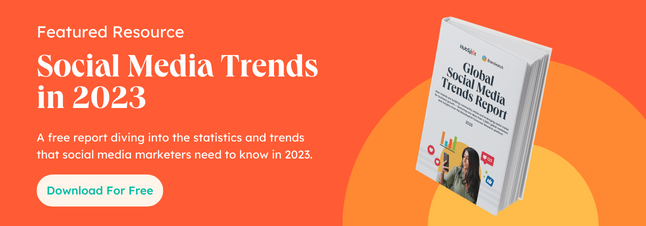
No hay comentarios:
Publicar un comentario